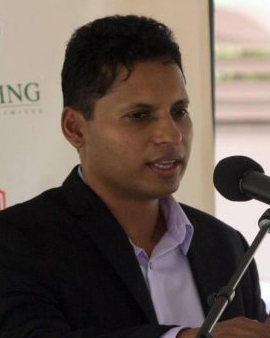Precedent set in other oil-producing developing countries compel Guyana to contemplate the likely impact of the advent of oil as a factor that could exacerbate the country’s crime situation, President of the Guyana Manufacturing & Services Association (GMSA) Shyam Nokta has said.
Addressing last Tuesday’s GMSA business luncheon at the Pegasus Hotel, Nokta suggested that there was precedent to suggest that shifts in economic focus occasioned by the emergence of an oil economy could bring about societal changes that could impact on the local crime situation. “Experience from other developing, oil-producing countries, including our neighbours, has shown that shrinkage of the agricultural and manufacturing sectors resulting in loss of jobs and economic opportunities in these sectors impose hardships on large numbers of people, often the poorest members of society…As Guyana moves into this new phase of development it is imperative that we learn from both the good and bad lessons,” Nokta said.
According to Nokta, threats to local and regional national security, not least the security of the business community could also be posed by the impact of ramped-up anti-drugs law enforcement actions targeting cartels in the wider hemisphere. This is forcing some of the big players in the illegal trade to examine ‘softer’ operating locations in the Caribbean, Nokta said.
“There is the view that intra-regional drug trafficking is a main force behind the upsurge in violent crimes in the region. More recently, there have been indications that crackdowns in parts of Central and South America have displaced cartels who are now intentionally moving into the Caribbean”, Nokta told the forum at the Pegasus Hotel.
“This is not good news. Considering where we are geographically, between suppliers and markets, coupled with the inadequate patrols of our expansive coastline and territorial waters, the Caribbean appears to be swimming against the tide,” Nokta said, adding that the magnitude of the potential challenge meant that “addressing drug-trafficking and the concomitant violent crimes that accompany it cannot be done by any single country or region.”
In a presentation that focused on the nexus between crime and economic development in the region Nokta asserted that crime levels were a key factor in determining the business climate. Contextually, he singled out “small countries”, which he said suffer disproportionately “both from crime which originates within our society and from crime driven by actions many miles from our shores.” At the same time Nokta asserted that while in such an environment “all citizens and businesses are vulnerable…………small businesses are particularly vulnerable as often they do not have the safeguards in place to prevent or detect criminal activity.”
Crime in the region and the ability of the state to provide adequate security for the business sector has been a recurring theme in contemporary public/private sector discourses in the region and on Tuesday Nokta alluded to what he said was the disproportionate suffering being endured by small countries in the region “both from crime which originates within our society and from crime driven by actions many miles from our shores.” The challenge, according to Nokta, was a region-wide one since he contended that while the Caribbean was “still a relatively peaceful region,” it had, “in the last decade or so, seen increasing levels of crime – from murder, armed robbery, kidnapping, organized crime, narco-trafficking and trafficking in persons and in recent times, cyber-crimes.”
And according to Nokta even in the absence of empirical data to show the impact of crime on the local business environment, the issue had “influenced private sector activity, affected livelihoods, families and individuals.” He contended that the issue of the “direct and indirect impacts” of crime on the country’s overall economic development was reflected in the “increasingly larger (budgetary) allocations…being made……..to implement several initiatives,” including, most recently, “the expansion of prisons and modernization of the police force.” Additionally, he asserted that security sector reform had been “a key issue for several years now.”





